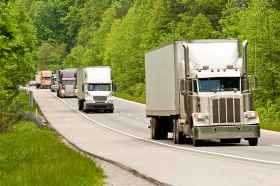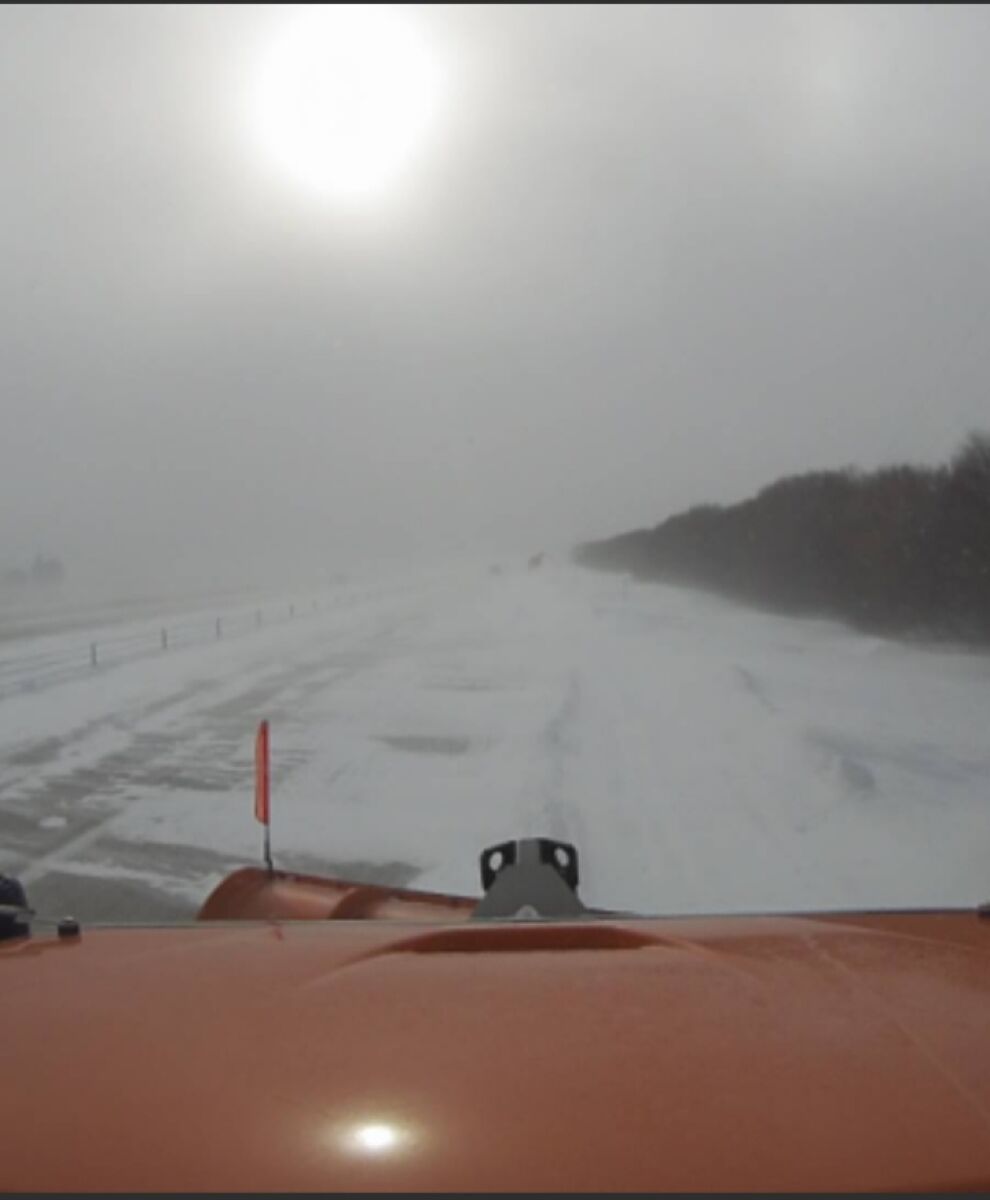Winter Storm
Topic 32732 | Page 4
My policy is if I can’t safely drive at the minimum speed limit, I should get off and get parked.
Getting off and parking is a little tougher in the LTL world. First, finding a spot to stop in a storm is almost impossible. Even more so if you're pulling doubles. Daycabs are also very uncomfortable when you're sitting for a while. And the worst part, it's a holiday weekend so nobody is coming to rescue you one the weather clears. That's why tracking weather conditions is important. If it's not safe, refuse to go out.
They may have comments, like what Rob is experiencing but I'd rather deal with that than being in an accident.
LTL:
Less Than Truckload
Refers to carriers that make a lot of smaller pickups and deliveries for multiple customers as opposed to hauling one big load of freight for one customer. This type of hauling is normally done by companies with terminals scattered throughout the country where freight is sorted before being moved on to its destination.
LTL carriers include:
- FedEx Freight
- Con-way
- YRC Freight
- UPS
- Old Dominion
- Estes
- Yellow-Roadway
- ABF Freight
- R+L Carrier
Doubles:
Refers to pulling two trailers at the same time, otherwise known as "pups" or "pup trailers" because they're only about 28 feet long. However there are some states that allow doubles that are each 48 feet in length.
I plan on being extra cautious by slowing it down even more then rainy conditions and at least doubling my following distance. Really hoping the area state salt crews are on their game on the majors and the landscapers get the salt down at the shippers/receivers in a timely manner
Shipper:
The customer who is shipping the freight. This is where the driver will pick up a load and then deliver it to the receiver or consignee.
OWI:
Operating While Intoxicated
My policy is if I can’t safely drive at the minimum speed limit, I should get off and get parked.
Getting off and parking is a little tougher in the LTL world. First, finding a spot to stop in a storm is almost impossible. Even more so if you're pulling doubles. Daycabs are also very uncomfortable when you're sitting for a while. And the worst part, it's a holiday weekend so nobody is coming to rescue you one the weather clears. That's why tracking weather conditions is important. If it's not safe, refuse to go out.
They may have comments, like what Rob is experiencing but I'd rather deal with that than being in an accident.
Yes, I see that you LTL drivers face some different challenges than OTR drivers do. I have great respect for you guys and what you do, especially getting loads into cramped, older locations. It looks to me that the weather will give us all a much needed break next week.
LTL:
Less Than Truckload
Refers to carriers that make a lot of smaller pickups and deliveries for multiple customers as opposed to hauling one big load of freight for one customer. This type of hauling is normally done by companies with terminals scattered throughout the country where freight is sorted before being moved on to its destination.
LTL carriers include:
- FedEx Freight
- Con-way
- YRC Freight
- UPS
- Old Dominion
- Estes
- Yellow-Roadway
- ABF Freight
- R+L Carrier
OTR:
Over The Road
OTR driving normally means you'll be hauling freight to various customers throughout your company's hauling region. It often entails being gone from home for two to three weeks at a time.
Doubles:
Refers to pulling two trailers at the same time, otherwise known as "pups" or "pup trailers" because they're only about 28 feet long. However there are some states that allow doubles that are each 48 feet in length.
I thought we were bad with communications. There's a number we call that has weather updates to let us know what's happening. Dispatchers will shoot a text with specific updates since the number provides very generic information.
My terminal is worst, we still didn't have a holiday schedule for this week unless we asked. Other terminals with a few hundred drivers had theirs 2 weeks ago, we have 55. They are supposed to call or text but neither myself or the 3 other drivers who start around my time heard anything.
I track the weather on the highways I'm expecting to travel on
That is exactly how I do it as well. Since I have a set run it makes it even easier I have several key cities saved along my route.
I have many years of experience driving in snow/ice from my landscaping days but I have zero so far with these tractors in snow/ice.
Honestly, I found the traction to be a little worse than I expected the first time I was in snow. Can you use a twin screw? I used one of those once and it is definitely a improvement.
Just take it nice and smooth don't be afraid to tell them if you feel unsafe. Sometimes new drivers can feel pressured to run.
Terminal:
A facility where trucking companies operate out of, or their "home base" if you will. A lot of major companies have multiple terminals around the country which usually consist of the main office building, a drop lot for trailers, and sometimes a repair shop and wash facilities.
Dispatcher:
Dispatcher, Fleet Manager, Driver Manager
The primary person a driver communicates with at his/her company. A dispatcher can play many roles, depending on the company's structure. Dispatchers may assign freight, file requests for home time, relay messages between the driver and management, inform customer service of any delays, change appointment times, and report information to the load planners.HOS:
Hours Of Service
HOS refers to the logbook hours of service regulations.Thanks for the heads up, I’ll keep that in mind but it might not be an option. We only have 1 twin screw at my terminal and thats used by a senior driver to haul our heavy vans to down to KeHe. A lot of our pups have to be pulled by a single screw due to landing gear placement so 2 stars would have to line up for that to work.
Terminal:
A facility where trucking companies operate out of, or their "home base" if you will. A lot of major companies have multiple terminals around the country which usually consist of the main office building, a drop lot for trailers, and sometimes a repair shop and wash facilities.
I track the weather on the highways I'm expecting to travel on
We don’t really travel outside a 50-60 mile radius for the P&D and most of it is south of Philly into Delaware/north Maryland so the weather at my house is basically the same as our area. We do run west out into Lancaster county, there its more likely that you could run into a sudden change with the rain/snow line
P&D:
Pickup & Delivery
Local drivers that stay around their area, usually within 100 mile radius of a terminal, picking up and delivering loads.
LTL (Less Than Truckload) carriers for instance will have Linehaul drivers and P&D drivers. The P&D drivers will deliver loads locally from the terminal and pick up loads returning to the terminal. Linehaul drivers will then run truckloads from terminal to terminal.

I'm not a driver but I really enjoy keeping up with most of the postings and it's influencing me about possibly changing careers. But that being said, it was reported by FOX a truck stop in Vivian SD was loaded up on truckers who were sitting out the snow. Snow drifts taller then the height of the various trucks were burying the drivers in their trucks and as you'd imagine all the highways were closed. As long as you got supplies and you've got fuel for your APU and it keeps working I guess you'd be able to ride things out...
https://www.msn.com/en-us/weather/topstories/buried-in-snow-semi-truck-drivers-spend-days-trapped-at-south-dakota-fuel-stop/ar-AA15xpw2
APU:
Auxiliary Power Unit
On tractor trailers, and APU is a small diesel engine that powers a heat and air conditioning unit while charging the truck's main batteries at the same time. This allows the driver to remain comfortable in the cab and have access to electric power without running the main truck engine.
Having an APU helps save money in fuel costs and saves wear and tear on the main engine, though they tend to be expensive to install and maintain. Therefore only a very small percentage of the trucks on the road today come equipped with an APU.


Current conditions on I35 from plow camera not far from my house. Google shows a multi vehicle accident just north with a SLOWDOWN to 63mph. Who the heck is driving that fast in this crap!? They're also now offering an additional $500 to take out a load that's sitting there. Still not worth it to me. Local sheriff's office has posted many videos showing conditions out there, many roads off the interstate have drifts over 4 feet high blocking the roadway. If it wasn't so cold (-7 windchill of -39) it wouldn't be nearly as big of a deal since the road treatments would actually work.
Interstate:
Commercial trade, business, movement of goods or money, or transportation from one state to another, regulated by the Federal Department Of Transportation (DOT).
OWI:
Operating While Intoxicated
As long as you got supplies and you've got fuel for your APU and it keeps working I guess you'd be able to ride things out...
One thing you need to remember if you're stranded in your vehicle is keeping the exhaust clear. Many trucks appear to be going away from the stacks pushing your exhaust above your cab like you see with the hood trucks. Our freightliners and internationals have the exhaust come out under the truck. If your truck is getting buried you risk the exhaust pooling under your vehicle and finding a way into the cab.
APU:
Auxiliary Power Unit
On tractor trailers, and APU is a small diesel engine that powers a heat and air conditioning unit while charging the truck's main batteries at the same time. This allows the driver to remain comfortable in the cab and have access to electric power without running the main truck engine.
Having an APU helps save money in fuel costs and saves wear and tear on the main engine, though they tend to be expensive to install and maintain. Therefore only a very small percentage of the trucks on the road today come equipped with an APU.

New Reply:
New! Check out our help videos for a better understanding of our forum features

















Preview:








 TT On Facebook
TT On Facebook
Deacons D , if you do get out there in questionable conditions, take it extra slow until you get the feel of it. Watch other trucks and try to follow the example of the most conservative drivers. My policy is if I can’t safely drive at the minimum speed limit, I should get off and get parked.
What about all the OTR drivers out there today? What’s it like in your area?
OTR:
Over The Road
OTR driving normally means you'll be hauling freight to various customers throughout your company's hauling region. It often entails being gone from home for two to three weeks at a time.